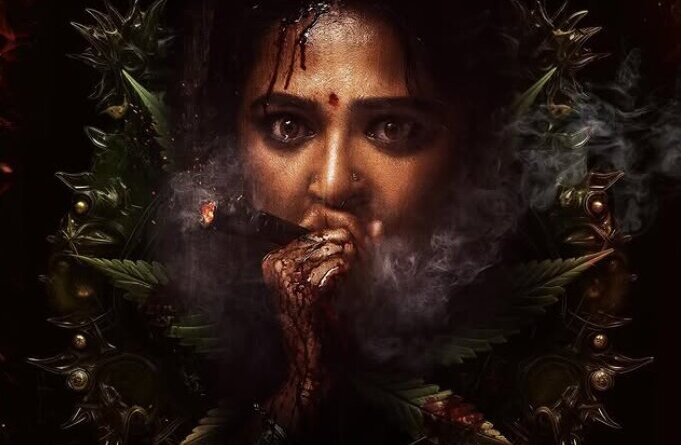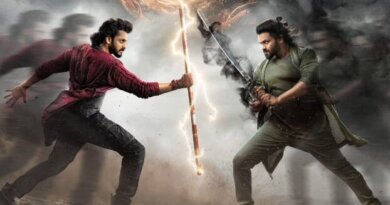Ghaati Movie Review

Cast – Anushka Shetty, Vikram Prabhu, Chaitanya Rao, Ravindran Vijay, Jagapathi Babu, Jisshu Sengupta
Directors – Krish Jagarlamudi
Producers – Rajeev Reddy & Sai Babu Jagarlamudi
Banner – First Frame Entertainments & UV Creations
Music – Nagavelli Vidya Sagar
Runtime – 02 Hrs 36 Mins
Genre – Action Drama
Release Date – 05-09-2025
Background
Set against the lush backdrop of the Eastern Ghats, “Ghaati” dives into the underbelly of cannabis cultivation and smuggling. Director Krish, known for his philosophical and mythological storytelling, returns with a tale that attempts to blend ethics with action. The film marks Tamil actor Vikram Prabhu’s Telugu debut, while Anushka Shetty takes center stage in a role that’s both grounded and symbolic. The narrative is rooted in the socio-economic struggles of tribal communities, particularly the Ghaatis, whose lives are intertwined with the cannabis trade. The story unfolds in a region where tradition clashes with modern exploitation. Krish’s intent is clear—he wants to deliver a message-driven film that challenges the viewer’s moral compass. However, the execution falters, leaving the audience with more questions than answers. The film’s production spanned several years, adding to the anticipation. With a strong ensemble cast and a unique setting, expectations were high. But the final product struggles to match the vision. The Eastern Ghats are beautifully captured, but the story fails to rise to the occasion.
Plot
Sheelavathi, a bus conductor, and Desi Raju, a lab technician, are saving up to marry. Their quiet lives are disrupted when cannabis kingpins discover a potent liquid strain named after Sheelavathi. As the mystery deepens, Desi Raju is revealed to be the mastermind behind the new cannabis formula. The couple’s involvement in the drug trade raises ethical dilemmas. Kundala Naidu and Kaastala Naidu, rival smugglers, seek to control the new strain. The film explores the motivations behind Desi Raju’s transformation. The Ghaatis’ role in the ecosystem adds cultural depth. Ultimately, the story is about survival, identity, and rebellion.
Artists Performances
Anushka Shetty plays Sheelavathi with restraint, but her performance lacks emotional range. She shines in the second half, especially in scenes that demand moral clarity. Vikram Prabhu’s Telugu debut is commendable, though his dubbing feels disconnected. Chaitanya Rao as Kundala Naidu delivers a standout performance, balancing menace with charisma. Jagapathi Babu adds comic relief as a morally grey cop, but his role is underwritten. Jisshu Sengupta is wasted in a forgettable part. Devika Priyadarshini and Raju Sundaram appear briefly, adding little to the narrative. The supporting cast, including VTV Ganesh and Larissa Bonesi, remain underutilized. Performances across the board feel uninspired, possibly due to weak character arcs. Anushka’s screen presence elevates key moments, but the ensemble fails to leave a lasting impact.
Technicalities
Nagavelli Vidya Sagar’s music is a major letdown, with songs that fail to resonate. The background score lacks punch, especially in action sequences. Editing by Chanakya Reddy Toorupu is inconsistent, dragging the pace in the second half. Manojh Reddy Katasani’s cinematography is the film’s strongest asset, capturing the Eastern Ghats with poetic flair. Visual effects are subpar, diminishing the impact of crucial scenes. Production design is adequate but lacks innovation. Costume choices reflect the rural setting but don’t stand out. Sound design is uneven, with abrupt transitions. The screenplay suffers from poor structure and pacing. Dialogues, once Krish’s strength, feel outdated and forced.
Positives
Anushka steals the show in emotionally charged scenes.
Director Krish attempts an ethical message-oriented narrative.
Eastern Ghats backdrop adds visual richness.
Cultural detailing of Ghaatis offers authenticity.
Negatives
Predictable and uninspired screenplay.
Substandard music and poor sound design.
Performances lack energy and conviction.
Analysis
Krish’s return to direction after a long hiatus was met with anticipation. Known for films like “Kanche” and “Gamyam,” his storytelling often blends philosophy with realism. In “Ghaati,” he tries to replicate that formula but falls short. The film opens with promise, introducing the Ghaatis and their connection to cannabis. The setting is fresh, and the initial scenes build intrigue. However, the narrative quickly loses momentum. The transformation of Desi Raju from a lab technician to a drug lord lacks emotional depth. His motivations are unclear, and the screenplay doesn’t justify his actions. Anushka’s character, though central, is underwritten. Her moral dilemmas are hinted at but never fully explored. The antagonists, Kundala and Kaastala Naidu, are caricatures rather than complex villains. Their rivalry adds noise but not substance. The second half is riddled with action sequences that feel repetitive and excessive. Krish’s dialogues, once his hallmark, are disappointingly clichéd. Lines like “Bayam leni kodi… bajarulo guddu pettindi” lack the philosophical weight of his earlier works. Only a couple of lines carry his signature depth. The film seems inspired by “Pushpa” but fails to build a compelling world. The Ghaatis’ traditions and rituals are shown in detail, offering glimpses of authenticity. Yet, these moments are isolated and don’t contribute to the larger narrative. Music, which could have elevated the emotional beats, is forgettable. The editing fails to maintain rhythm, especially during transitions between drama and action. Cinematography stands out, with sweeping shots of the Ghats that evoke a sense of place. But visuals alone can’t save a weak story. The performances reflect the screenplay’s shortcomings. Most actors appear disengaged, and their roles lack purpose. Anushka tries to anchor the film, but even she struggles with the material. Vikram Prabhu’s effort is evident, but the language barrier affects his delivery. The film’s ethical message—about exploitation, survival, and rebellion—is noble. However, the execution is muddled. Krish’s intent is clear, but the storytelling doesn’t support it. The climax is abrupt and lacks emotional payoff. “Ghaati” had the potential to be a powerful drama rooted in culture and conflict. Instead, it becomes a missed opportunity. The film may appeal to viewers interested in regional stories, but its flaws are hard to overlook.
Final verdict :- A visually rich yet narratively uneven film that redeems itself with a message worth reflecting on..
Rating :- 2.1/5




